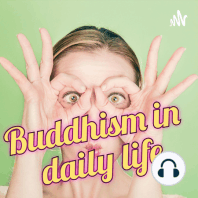4 min listen

237-Many Buddhists live by precise rules- Buddhism in daily life
237-Many Buddhists live by precise rules- Buddhism in daily life
ratings:
Length:
6 minutes
Released:
Nov 25, 2022
Format:
Podcast episode
Description
Many Buddhists live by precise rules
Buddhism and rules
Many Buddhists live by precise rules.
Buddhists should not eat meat, should not have sex, should do this, should not do that, should pray this way or that way; rules upon rules.
The study of sutras, the interpretation of words, and the precise meditation are at the heart of many Buddhist traditions.
But where do most of these precepts come from?
These rules were established mainly by monks and Buddhist "scholars" after the Buddha's death, similar to the myriad rules and regulations issued by the Catholic Church long after the death of Jesus Christ.
Can these later-established Buddhist rules and regulations be reconciled with the values of the historical Buddha?
I say no!
Buddha meditated for years to experience enlightenment and failed. Even Wikipedia states that Buddha did not achieve "enlightenment" through meditation and asceticism (rules).
When he had "given up" emaciated and close to death, he took a bath on the bank of the Neranjara River.
Then, settling down on the river bank, he experienced "enlightenment."
Only when the historical Buddha had completely let go, already completely given up, did he awaken.
Today we hear again and again that as a Buddhist one has to meditate in such and such a way, to imitate Buddha, to follow such and such rules.
Buddha himself could not explain how he experienced "enlightenment", Buddha has left no text from which it would be evident how one can experience "enlightenment".
In his "Dharma talks" he instructed his followers not to meditate, but to search for "enlightenment" within themselves.
His way was to limit the ego of his followers, to abolish one bad habit after another in them.
All rules are nothing but opinions and instructions.
However, it is not about following rules, but about achieving "enlightenment", about "awakening".
Most of the rules were created by the people who themselves were "not awakened" and did not really understand Buddha.
What made the historical Buddha so famous, so popular, that he is still a role model for millions of people today?
RULES?
NO!
Buddha is a household name to us because he experienced "enlightenment," not because he meditated for six years.
Although he explicitly said that he did not achieve his "enlightenment" through meditation, countless people meditate in hopes of awakening through it.
Rules upon rules!
THAT TASTE IS GOOD WHICH AGREES WITH THE RULES WHICH HAVE BEEN ESTABLISHED BY REASON
- JOHANN CHRISTOPH GOTTSCHED - GERMAN WRITER - 1700 TO 1766
Copyright: https://shaolin-rainer.de
(Please also download my app "Buddha-Blog English" from the Apple and Android stores)
Please rate us on Apple, Google, or Spotify podcast to help us promote the show
Buddhism and rules
Many Buddhists live by precise rules.
Buddhists should not eat meat, should not have sex, should do this, should not do that, should pray this way or that way; rules upon rules.
The study of sutras, the interpretation of words, and the precise meditation are at the heart of many Buddhist traditions.
But where do most of these precepts come from?
These rules were established mainly by monks and Buddhist "scholars" after the Buddha's death, similar to the myriad rules and regulations issued by the Catholic Church long after the death of Jesus Christ.
Can these later-established Buddhist rules and regulations be reconciled with the values of the historical Buddha?
I say no!
Buddha meditated for years to experience enlightenment and failed. Even Wikipedia states that Buddha did not achieve "enlightenment" through meditation and asceticism (rules).
When he had "given up" emaciated and close to death, he took a bath on the bank of the Neranjara River.
Then, settling down on the river bank, he experienced "enlightenment."
Only when the historical Buddha had completely let go, already completely given up, did he awaken.
Today we hear again and again that as a Buddhist one has to meditate in such and such a way, to imitate Buddha, to follow such and such rules.
Buddha himself could not explain how he experienced "enlightenment", Buddha has left no text from which it would be evident how one can experience "enlightenment".
In his "Dharma talks" he instructed his followers not to meditate, but to search for "enlightenment" within themselves.
His way was to limit the ego of his followers, to abolish one bad habit after another in them.
All rules are nothing but opinions and instructions.
However, it is not about following rules, but about achieving "enlightenment", about "awakening".
Most of the rules were created by the people who themselves were "not awakened" and did not really understand Buddha.
What made the historical Buddha so famous, so popular, that he is still a role model for millions of people today?
RULES?
NO!
Buddha is a household name to us because he experienced "enlightenment," not because he meditated for six years.
Although he explicitly said that he did not achieve his "enlightenment" through meditation, countless people meditate in hopes of awakening through it.
Rules upon rules!
THAT TASTE IS GOOD WHICH AGREES WITH THE RULES WHICH HAVE BEEN ESTABLISHED BY REASON
- JOHANN CHRISTOPH GOTTSCHED - GERMAN WRITER - 1700 TO 1766
Copyright: https://shaolin-rainer.de
(Please also download my app "Buddha-Blog English" from the Apple and Android stores)
Please rate us on Apple, Google, or Spotify podcast to help us promote the show
Released:
Nov 25, 2022
Format:
Podcast episode
Titles in the series (100)
006-Buddhism in daily life - The beauty of simplicity by Buddhism in daily life - Mindfulness in every day tasks